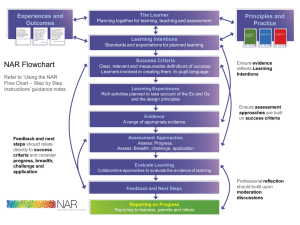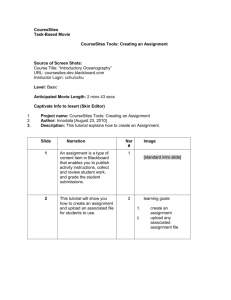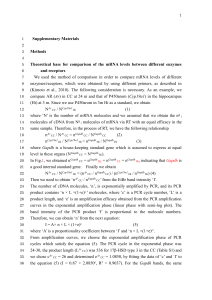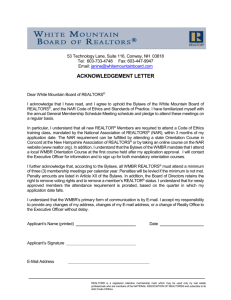Using NAR for Assessment
advertisement
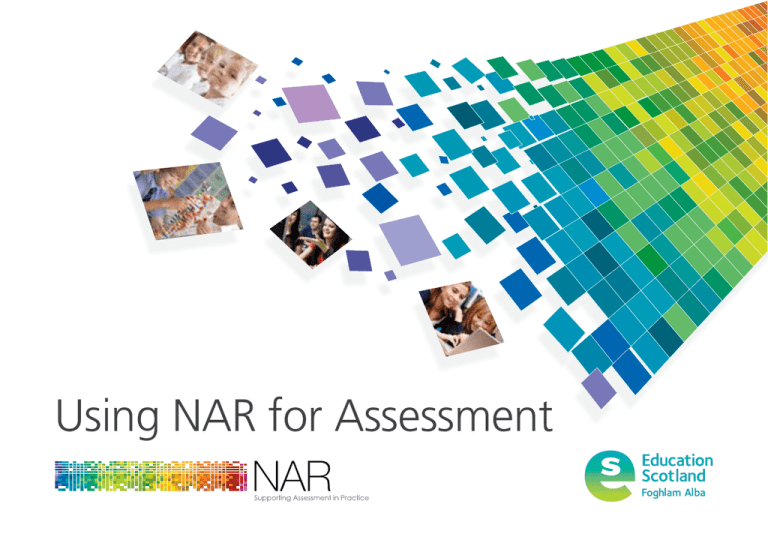
Using NAR for Assessment U se this guide to explore the content, online tools and functions available on NAR. Review the assessment materials provided nationally to help you create your own assessment materials. Sharing your own materials and participating in moderation activities will help you to develop your understanding of sound assessment practice in the context of Curriculum for Excellence, develop a shared understanding of standards and expectations, and help you make sound judgements which can be consistently applied. Online Help is available on NAR which will provide you with step by step instructions on how to use the technical tools available, such as ‘search’, ‘browse’, ‘upload’, ‘create question’ and ‘build assessment’. Introduction 02 / Using NAR for Assessment “One of the key functions of the National Assessment Resource is to provide a way for teachers to develop a shared understanding of standards and expectations. The Resource will support teachers in deepening their understanding and expertise in assessment. It will also help develop their capacity to make sound judgements about progress and achievement.” BtC 5, a framework for assessment (p41) www.narscotland.org.uk / 03 understand • How you can develop your thinking and practice of assessment in the context of Curriculum for Excellence. • How you can build on the emerging practice and examples provided on NAR to help you extend your range of assessment approaches. • How you can use the assessment exemplars and materials to provide a focus for reflection and professional dialogue. • How you can use the exemplars to develop a shared understanding of standards and expectations which can be applied fairly and consistently. • How you can use NAR as a forum to share your comments and ideas. 04 / Using NAR for Assessment Access NAR using your Glow or SQA Connect username and password. Starter tasks 1.Search for an assessment exemplar and look at the teaching, learning and assessment process. (Supporting information is available for you to download in the welcome area on your NAR homepage.) In what ways is this exemplar similar or different to your practice? Identify the variety of approaches to assessment within the exemplar and discuss the quality of the evidence gathered in relation to the success criteria. Consider the standards and expectations that have been set for the learners. 2.Search for an SQA assessment task. Consider how you could use or adapt this for use with your learners. How does this task compare with what you already present to your learners? www.narscotland.org.uk / 05 using nar • Find NAR exemplars of assessment in practice developed and created by real teachers in real classrooms (these exemplars are for guidance and practitioners are not expected to record this level of detail as part of their everyday practice in the classroom). • Find examples of the types of assessment materials developed by SQA to assess literacy and numeracy. 06 / Using NAR for Assessment Starter tasks 1.Start by browsing for assessment exemplars and assessment tasks so that you can explore the variety of items contained in NAR. You will also see how items are classified and how important the description of the item is in helping you to find what you are looking for. 2.You can then use the search and advanced search functions to look for materials relevant to your learners and setting. The NAR Online Help facility provides detailed advice on how to browse and search effectively. www.narscotland.org.uk / 07 • Use NAR exemplars to see how practitioners have developed learning using the experiences and outcomes and created learning intentions and success criteria. • Explore each element of the planning process demonstrated in the exemplars. • Reflect on the learning experiences described in the exemplars and consider their relevance to your own practice. • See how the practitioners have provided opportunities for ongoing assessment. This includes peer and self-assessment, the delivery of quality feedback and next steps in learning. • See how practitioners have agreed the standards and expectations of learning. • Use this process as a model to develop thinking about your planning, or take any of the elements of the planning process as a focus for development and improvement. plan 08 / Using NAR for Assessment Starter tasks 1.Look at the NAR flowchart (in the Welcome section) and consider the planning process as a whole. In what ways does this reflect or differ from your practice? Identify an element of planning, eg success criteria, as a focus for development in task 2. Moderation activities involve teachers working collaboratively, and using resources such as NAR will help ensure that you develop a shared understanding of standards and expectations. 2.Review NAR exemplars, focusing on your chosen element, and compare with your own practice. Using the supporting information on NAR for further guidance, discuss the approach with your colleagues. Reflective questions could include: i. Is there appropriate challenge within the learning? ii. Is progression evident? iii.In what ways does this fit with your understanding? iv.In what ways are the learners involved in the whole process? v. What do you think has been done well? vi.What would you do differently? www.narscotland.org.uk / 09 create • Replicate the NAR process by creating an exemplar. • Create new assessment materials for your learners that reflect the teaching and learning in your classroom. • Develop individual assessment questions, fuller assessment sheets or tasks. • Combine your assessment questions with other materials that have been shared on NAR. • Copy, amend or adapt existing NAR materials to suit the needs of your learners. • Link assessment materials to create a package of items that can be used in conjunction with each other. 10 / Using NAR for Assessment Starter tasks 1.Use the ‘create question’ function to begin to make your own assessment materials. You can create a number of questions and save them in your work area. Select from a range of question types including ‘multiple choice’, ‘text response’, ‘fill the blanks’ or ‘text matching’. 2.You can build an assessment using the questions you have created, or from questions other people have created, to put together a variety of questions to create assessments for your learners. www.narscotland.org.uk / 11 share • Upload and publish the assessments you have created for others to find, use and adapt. • Classify your materials in terms of Curriculum for Excellence level/s, curriculum area/s and experiences and outcomes to help others find them. • Describe your materials to provide information and context to other NAR users. 12 / Using NAR for Assessment “Teachers being involved in developing their assessment approaches through participation in moderation activities is a highly effective form of professional development.” BtC 5: a framework for assessment (p37) Starter tasks 1.Upload a file that you currently use and find useful for assessing learners progress and achievements within the experiences and outcomes and share this within NAR. Classify your materials in terms of Curriculum for Excellence level/s, curriculum area/s, experiences and outcomes, level of moderation, and provide a description. Publish the resource. 2.Create an assessment using the ‘build assessment’ tool as described in your 'Create' starter task. Classify your assessment in terms of Curriculum for Excellence level/s, curriculum area/s and experiences and outcomes, and provide a description. Publish your assessment. Refer to the NAR Online Help Guide for step by step instructions. www.narscotland.org.uk / 13 Moderation involves reflection and dialogue about learning. Practitioners can use NAR materials as a focus for moderation activities. When uploading materials, practitioners will be expected to specify whether moderation has taken place at peer, school, cluster or local authority level. Local authorities can make individual arrangements for moderation at authority level and can also put forward exemplars created by practitioners for national quality assurance and moderation. Practitioners can find exemplars that have been quality assured through moderation at a national level. Although some of these have been quality marked as strong examples of sound assessment practice, all exemplars which have gone through the national quality assurance process are of good quality and well worth exploring. moderate 14 / Using NAR for Assessment “Moderation helps to raise standards and expectations and levels of consistency across teachers and schools. This ensures that there is an appropriate focus on outcomes for learners, that learning is at the appropriate level and that learners develop the skills for learning, skills for life and skills for work, including higher order thinking skills, which will allow them to be successful in the future.” BtC 5: a framework for assessment (p37) Starter tasks Select an exemplar and use this as a focus to discuss standards and expectations. This will involve making, agreeing and sharing judgements about the quality of the learning experiences and the impact on the learner. You may wish to compare what you observe from the exemplar with what is happening in your setting. Consider how you might include aspects of the NAR process in your practice. For example, can you work with a colleague to discuss plans to develop learning in a shared context, or to show progression of learning within an experience and outcome? www.narscotland.org.uk / 15 “Ultimately as confidence and understanding grows, teachers will have more ownership of the National Assessment Resource”. BtC5: a framework for assessment (p41) The potential of NAR can be truly fulfilled by practitioners using it together to achieve success. By sharing your materials with others, and using NAR as a tool to support your practice, we can make a positive impact on the learning experiences and outcomes for Scotland’s young people. Online Help is available on NAR and provides step by step instructions on how to use NAR. Guidance and supporting documentation is available at: www.narscotland.org.uk For any other assistance contact the NAR helpdesk: helpdesk@NARScotland.org.uk or Tel: 0845 270 0844.
